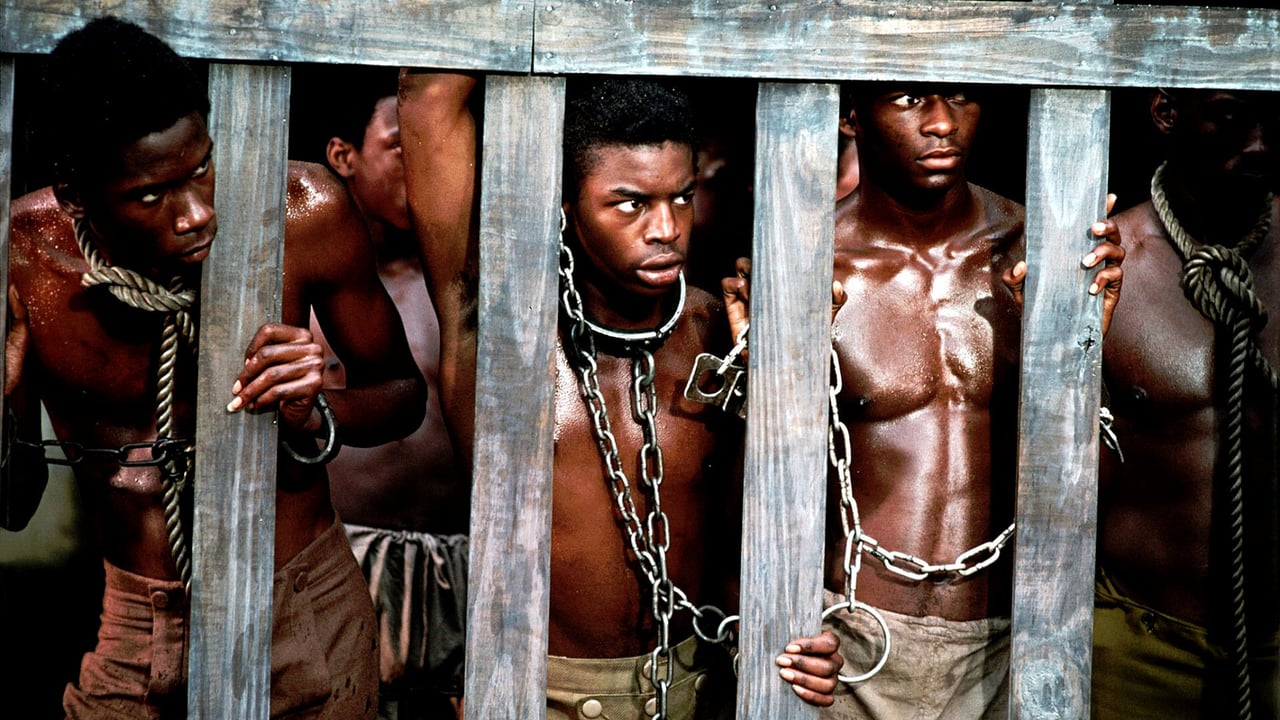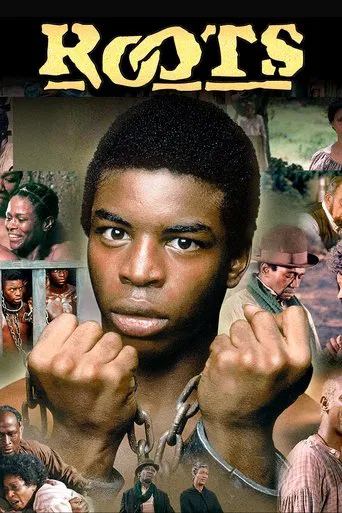

While it doesn't offer any answers, it both thrills and makes you think.
... View MoreTrue to its essence, the characters remain on the same line and manage to entertain the viewer, each highlighting their own distinctive qualities or touches.
... View MoreAll of these films share one commonality, that being a kind of emotional center that humanizes a cast of monsters.
... View MoreThis film is so real. It treats its characters with so much care and sensitivity.
... View MoreSoon after this mini-series first came out on television, I remember that the biggest 'shock' that was written about and publicized wasn't about the cruelty and unfairness of slavery; or, the praising of its all-star cast and production; or, even Alex Haley's achievements as a writer!?!? It was about the actor, Ralph Waite (Daddy Walton on "The Waltons") - the once family-friendly patriarch of a nice family now using racially-degrading terms!?!? WHAT!?!? That's what people found most important about this mini-series...a talented 'white' actor being criticized for portraying a white-slave-trader 'character,' written about by a talented 'black' writer!?!? What was he supposed to do...pass-up the role? If he had, someone else would have done it!Since then, I've read a lot of reviews, on and off of IMDb, about how this isn't really based upon Alex Haley's own 'roots;' how it's plagiarized from another writer; that it's altogether 'fake;' etc; etc. Who cares!?!? This series depicts human nature and how people were throughout an old period in American History...EVERY American's American HISTORY!It's a great read as a book, and, a great achievement as a mini-series! Whether or not these events happened in-full or in-part as they are depicted, they had to have happened somewhere at some time. Maybe in Africa, Asia, and/or South America during their European colonization; maybe in Asia when Japan raped Nanking, China, and, other nations before and during World War II; maybe in Africa, or, anywhere else in the world (Europe; Native America; etc.), when one tribe of people enslaved another; etc.If any or all of this is the case...then, "Roots" isn't only an 'American' story...it's a worldwide "HUMAN" story. A story of mankind's darker side in general - about what happens when 'any' powerful people invade and enslave 'any other' weaker people, anywhere in the world, past and present.If that's the case, then, 'this' is the 'real' "GREATEST STORY EVER TOLD"...only told in an old American setting.
... View MoreBack in 1977 the miniseries Roots told the story of Kunta Kinte, one of many young people kidnapped from the west coast of Africa and transported across the Atlantic to be sold into slavery in the southern US states. While this was perhaps a brave subject for TV in 1977, such tales had been sensationalist popular fiction for some time. But Roots went further: it went on to recount Kunta Kinte's life, and followed the lives of his descendants up to the point where his modern day descendant Alex Hailey, author of the book from which the TV series was developed, went to Africa in search of his ancestral roots, and tracked down his far-distant family in the village from which Kunta Kinte had been kidnapped.This inspiring story - extremely well told in the TV series within the standards of the time - was then damaged by the revelation that Hailey had blatantly copied large chunks of story material relating to Kunta Kinte's life in Africa from a work by another author: the plagiarism suit was ultimately resolved with an out-of-court settlement, but the damage had been done.This is an enormous shame because the importance of this series cannot be underestimated. The impact on TV in general was vast, but the impact on the viewing public was even greater - it brought a degree of awareness to a relatively ignorant western world as to exactly what the forebears of the black population had been through (albeit somewhat softened for TV consumption). And notwithstanding the specific untruth of Hailey's plagiarism, the fact remains that the TV series told a wider truth, and in a way which was accessible to a wider public.The adaptation was excellent, the casting and performances were, for the most part, first rate, and Quincy Jones' theme was memorable.
... View MoreTaken from http://www.martinlutherking.org/roots.htmlJanuary 16, 2002 -- ON Friday, NBC will air a special commemorating the 25th anniversary of the landmark miniseries based on Alex Haley's book "Roots." Ironically, the original series aired on ABC - but officials at that network took a pass on broadcasting the tribute.What's truly amazing, however, is that "Roots" is receiving a reverential tribute at all. For while the miniseries was a remarkable - and important - piece of television, the book on which it was based has now been widely exposed as a historical hoax.Unfortunately, the general public is largely unaware of how Haley's monumental family autobiography, stretching back to 18th-century Africa, has been discredited.Indeed, a 1997 BBC documentary expose of Haley's work has been banned by U.S. television networks - especially PBS, which would normally welcome such a program.Coincidentally, the "Roots" anniversary comes amid the growing scandal over disclosures of historian Stephen Ambrose's multiple incidents of plagiarism. Because as Haley himself was forced to acknowledge, a large section of his book - including the plot, main character and scores of whole passages - was lifted from "The African," a 1967 novel by white author Hal Courlander.But plagiarism is the least of the problems in "Roots." And they would likely have remained largely unknown, had journalist Philip Nobile not undertaken a remarkable study of Haley's private papers shortly before they were auctioned off.The result was featured in a devastating 1993 cover piece in the Village Voice. It confirmed - from Haley's own notes - earlier claims that the alleged history of the book was a near-total invention."Virtually every genealogical claim in Haley's story was false," Nobile has written. None of Haley's early writing contains any reference to his mythic ancestor, "the African" named Kunta Kinte. Indeed, Haley's later notes give his family name as "Kante," not "Kinte."And a long-suppressed tape of the famous session in which Haley " found" Kunta Kinte through the recitation of an African "griot" proves that, as BBC producer James Kent noted, "the villagers (were) threatened by members of Haley's party. These turn out to be senior government officials desperate to ensure that things go smoothly."Haley, added Kent, "specifically asks for a story that will fit his predetermined American narrative."Historical experts who checked Haley's genealogical research discovered that, as one put it, "Haley got everything wrong in his pre-Civil War lineage and none of his plantation ancestors existed; 182 pages have no basis in fact."Given this damning evidence, you'd think Haley's halo would long ago have vanished. But - given this week's TV tribute - he remains a literary icon. Publicly, at least.The judge who presided over Haley's plagiarism case admitted that "I did not want to destroy him" and so allowed him to settle quietly - even though, he acknowledged, Haley had repeatedly perjured himself in court.The Pulitzer Prize board has refused to reconsider Haley's prize, awarded in 1977 - in what former Columbia President William McGill, then a board member, has acknowledged was an example of "inverse racism" by a bunch of white liberals "embarrassed by our makeup."Yet the uniqueness of "Roots" is that it was presented as factual history, albeit with fictional embellishments. Haley himself stressed that the details came from his family's oral history and had been corroborated by outside documents.But Professor Henry Louis Gates of Harvard, a Haley friend, concedes that it's time to "speak candidly," adding that "most of us feel it's highly unlikely that Alex actually found the village from whence his ancestors came.
... View MoreWhen Roots first aired 30 years ago, I was in 3rd grade and unaware of any political and economic ties to slavery. At that time, all I knew was that my ancestors were slaves. Last night, the first episode aired on a cable channel and I was disappointed because of how we were portrayed. From what I studied in college in my African American history classes, we were not savages as portrayed in the movie. We were kings and queens. The scene where Kunta Kinte scared off the tiger was appalling. I guess Kunta was supposed to be some kind of brute. This is what we have been taught throughout history--that we were savages and amazons, which is entirely untrue. I wish they would have portrayed us in a more positive manner. As an adult watching the movie, it was "made for TV" meaning that they had to have a sympathetic white person on the cast to cover-up what really went on. It's an historical event and movie, but I feel to was too commercialized. A movie that I feel honestly deals with the plight of the black race since slavery was Spike Lee's "Malcolm X."
... View More